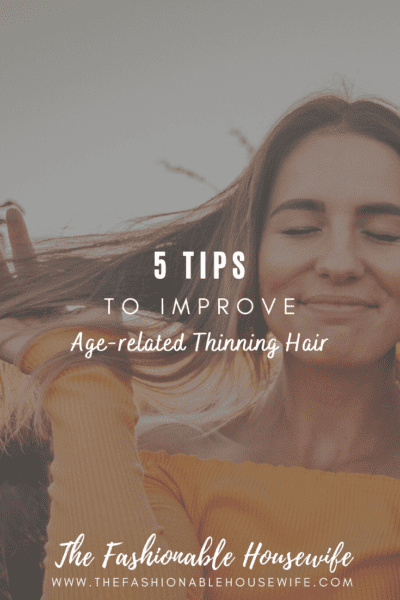
In your 40’s, you may find that age has left your hair appearing thin and flat. Women’s hair loss becomes increasingly common after menopause. Nearly two-thirds of post-menopausal women will encounter bald spots or hair thinning. Although hormones and genetics are uncontrollable factors contributing to hair loss, there are several remedies for thinning hair. Keep reading to learn how to add thickness to your mane.
What is Thin Hair?
Thin hair refers to the number of individual strands rather than the width of each hair shaft. This means, looking at the density of the hair and how close/far apart your strands are from each other. Your hair is made of protein strands and typically has a life of two to seven years. With age, your hair’s life cycle becomes shorter and your follicles stop regenerating new strands that fall out. As your hair thins, scalp visibility increases and strands are prone to breakage.
What Causes Age-Related Thin Hair?
- Genetics: The most common cause of hair loss is a hereditary condition that occurs with aging. This condition is called androgenic alopecia, female-pattern baldness. It typically occurs gradually and in predictable patterns. Women will notice thinning hair along the crown of the scalp
- Hormonal changes and medical conditions: A variety of conditions can cause permanent or temporary hair loss, including hormonal changes due to pregnancy, childbirth, menopause and thyroid problems. During menopause, high levels of dihydrotestosterone (DHT) cause your hair follicles to shrink.
- Medications Hair loss can be a common side effect of certain drugs, such as those used for cancer, arthritis, depression, heart problems, gout, and high blood pressure.

5 Tips to Improve Thinning Hair
To fortify and thicken your hair for healthier years to come, stay persistent in practicing these five tips to stop or prevent age-related thinning hair:
1. Use Volumizing Products
Many shampoos are chemical-heavy and use harsh sulfates. The salt found in sulfates will strip away the natural moisture in your hair. They act as detergents, washing away conditioner layers and free lipids present inside your cuticle, which leads to damaged hair. To properly strengthen and thicken your hair, it is best to use a shampoo with gentle ingredients, like argan oil, bamboo, seed oil, biotin, and caffeine.
Thinner hair tends to lay flat, so it is necessary to boost your hair at the roots to produce a fuller-look. Volumizing products strengthen, lift, and plump each strand of hair. A volumizing shampoo will target your scalp follicles and the base of your hair shafts, which will cleanse any product-residue or build-up. The consistent use of a volumizer will lead to bouncier, fuller hair.
2. Nourish & Feed your Scalp
A healthy scalp environment will enable your hair to grow in strong enough to support thick strands. Scalp skin is similar to normal skin in that it has an epidermis and dermis, but also has a higher concentration of large, terminal hair follicles. Scalp damage results from excessive sun exposure, hair care products and treatments, and nutritional imbalances. Scalp damage can negatively affect the hair growth process.
To efficiently care for your scalp, use products with gentle ingredients and appropriate pH levels. A scalp serum is a beneficial way to repair damage, increase growth and shine, and protect against environmental damage. If your scalp is prone to dryness, a serum will gently remove excess buildup, while providing more hydration. A serum for an oily scalp will correct imbalances and soothe inflammation of the hair follicle, which manages oil production.
Also, a deep scalp cleanser, like the one from Better Not Younger, will exfoliate, clean and stimulate your scalp skin. It is important to rid your scalp of any buildup and draw out impurities that will cause dryness, itching and thinner hair.
3. Nutrient-Rich Diet
Don’t underestimate the power of boosting your hair from the inside out. Your body requires proper levels of vitamins and minerals to support healthy, strong hair. A lack of micronutrients can lead to dull, weak hair.
Implement these essential vitamins into your diet to build stronger and thicker hair.
- Vitamin A
Vitamin A is associated with improved blood circulation, initiating hair growth, and regeneration. Vitamin A also benefits scalp dryness by regulating the oil production in your sebaceous glands, ensuring your scalp has a proper amount of sebum. Strong sources of vitamin A include carrots, fish, squash, cantaloupe, and bell peppers.
- Vitamin B
B-vitamins manufacture red blood cells that deliver oxygen and nutrients to your scalp and hair follicles. These vitamins also control the secretion of excess oil from the scalp and the skin. A well-known vitamin B7, biotin, improves hair texture, increases breakage resistance, and hydrates the scalp. Consume eggs, leafy greens, dairy products, seeds, and seafood for vitamin B.
- Vitamin C
Vitamin C supports your body’s collagen production and iron absorption. Also, vitamin C helps distribute oxygen throughout your body. Foods that are high in Vitamin C are citrus fruits, leafy greens, peppers, and potatoes.
- Vitamin D
Vitamin D can stimulate old hair follicles and generate new ones. Foods like salmon, orange juice, soy milk, egg yolk, and tuna have high levels of vitamin D.
- Vitamin E
Vitamin E reduces the oxidative stress on your scalp by balancing your skin’s antioxidants. Vitamin E also increases blood circulation and spreads crucial follicle nutrients to your scalp. Vitamin E is found in plant-based oils, nuts, and seeds.
- Iodine
Iodine helps prevent hair breakage and ensures a proper growth process. Foods high in iodine include shrimp, dairy products, and eggs.
- Iron
An iron deficiency causes anemia, which contributes to hair loss for women. Oysters, mussels, clams, spinach and raisins are rich in iron.
- Zinc
Zinc has antioxidant properties that reduce the inflammatory response to dead cells, dirt, oil, and bacteria. Additionally, zinc helps to regulate keratinocyte activation. Keratinocytes are skin cells that generate keratin, a fibrous protein that binds skin cells and hair filaments. Try to include lentils, yogurt, pork, seeds, and mushrooms into your diet for steady levels of zinc.
4. Protect your Strands
To prevent thinning, turn down the heat in the shower and on your hot tools. Heat strips your hair of its natural oils that keep it moisturized and smooth. It removes keratin at the follicle level, which can result in thin and course hair. The temperature of your hot tool will vary based on your hair type; however, the safest range is 200-350 degrees. The appropriate temperature will allow you to straighten or curl your hair only once. Excessive heat styling can cause split ends and broken strands that result in thinner-appearing locks. Lastly, never skip the heat protectant, when applying heat to your hair.
5. Keep Stress at Bay
Emotional stress is negatively impacting your hair loss, called telogen effluvium. The majority of hair follicles are in the growth phase (anagen). The hair follicles transition to the resting phase (telogen) the hair sheds. When stress overwhelms the body, it triggers the hair to shift into the telogen phase. This shift can lead to excessive hair shedding or loss.
It would be impossible to control all situations that may cause emotional stress. When time allows, meditate, exercise, or take a relaxing bath to relieve yourself from unnecessary stress.
Hopefully with these tips you can help stop or reverse the affects of your age-related thinning hair.



